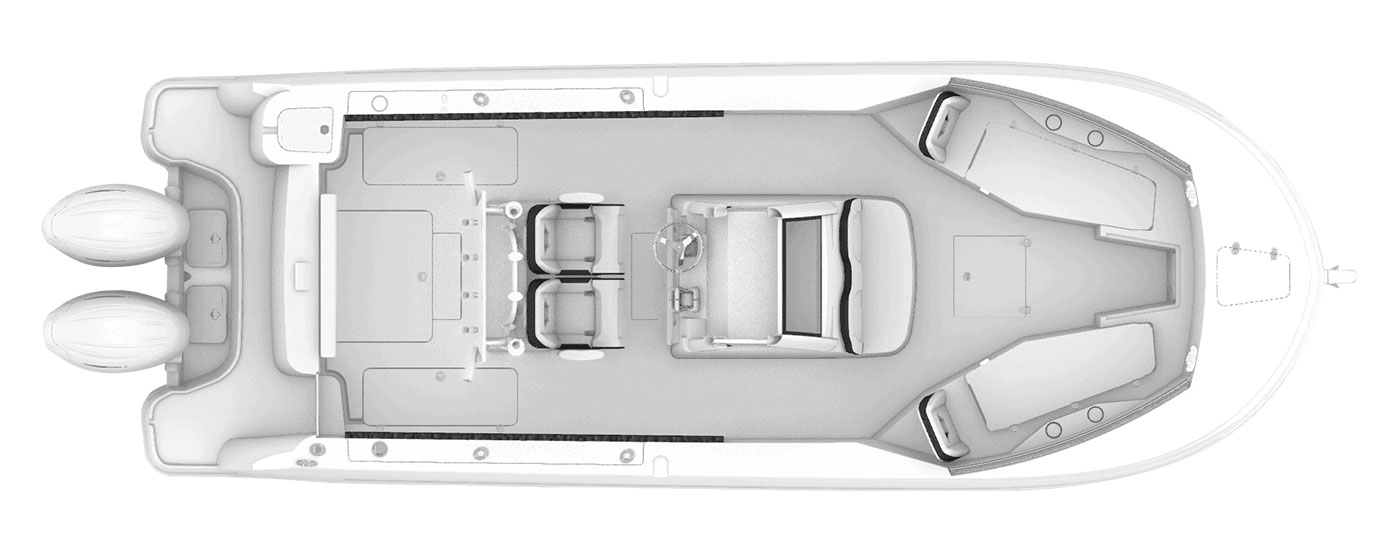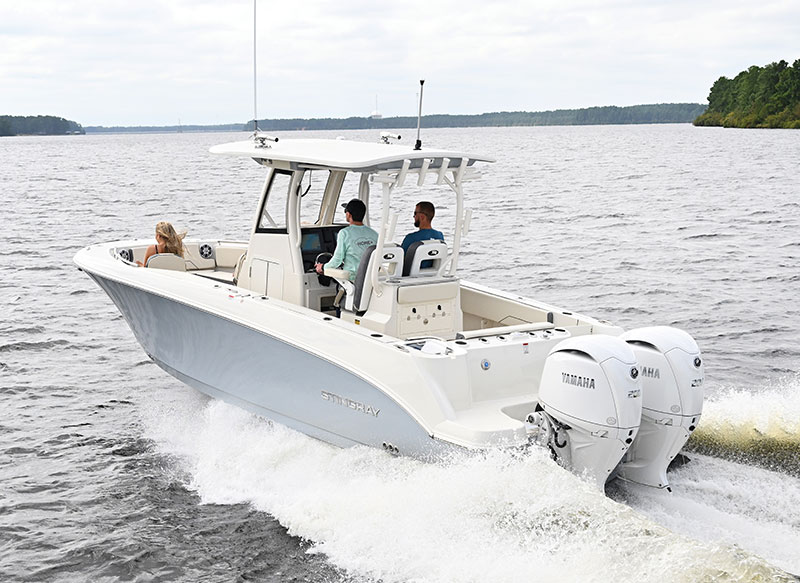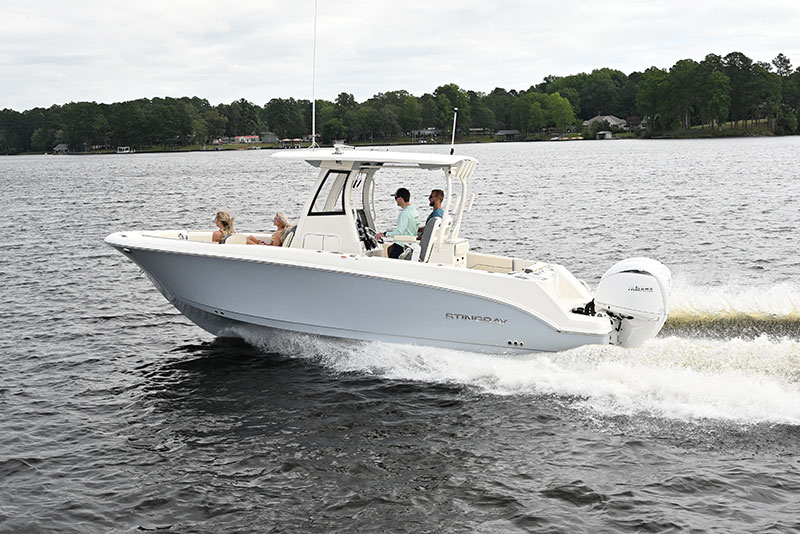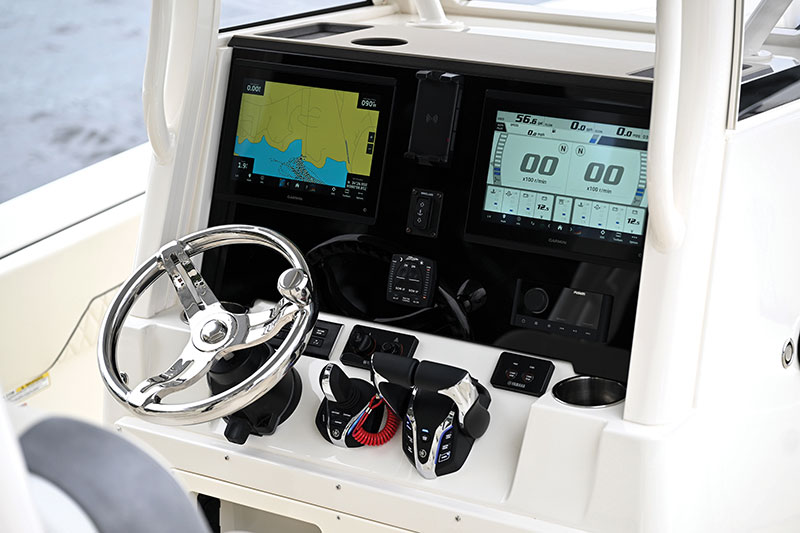Further offshore.
by John Wooldridge
The new Stingray 253 Center Console is the company’s second entry into the open-water family fishing and cruising market — a worthy sibling to the 273CC introduced just last year.
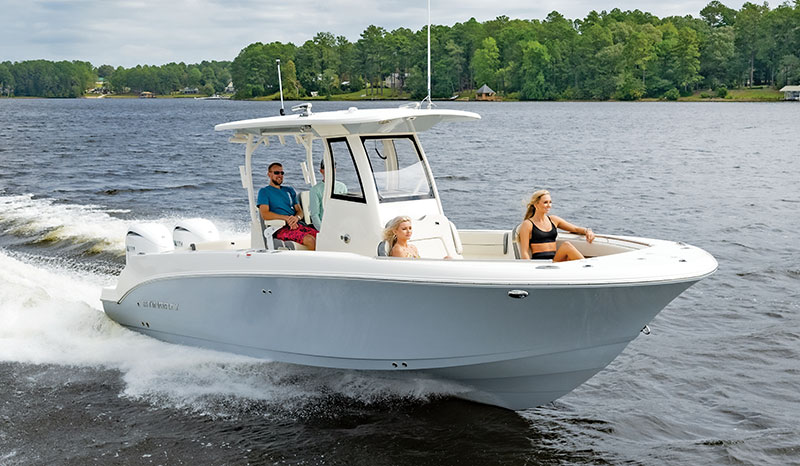
Photos Courtesy of Stingray
Like the larger 27-footer, the 253CC has more freeboard, more flare forward, and a deeper-V bottom shape to deal with larger waves and higher speeds.
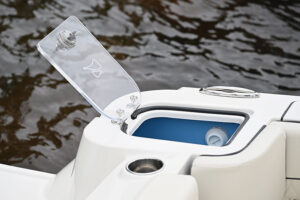 Starting with a nicely raked stem, the deep-V hull has 55 degrees of deadrise forward that changes smoothly to 35 degrees amidships and 21 degrees at the transom, offering a soft reentry in rough water conditions. There’s a significant spray rail above the waterline forward that forces spray downward, then curves down to the waterline and widens as it flows aft, forming a significant chine that helps to produce smoother turns and also helps minimize roll resistance at slower speeds. Under the water, the company’s exclusive Z-Plane lifting strakes are precision-placed to minimize bow rise and maximize fuel mileage.
Starting with a nicely raked stem, the deep-V hull has 55 degrees of deadrise forward that changes smoothly to 35 degrees amidships and 21 degrees at the transom, offering a soft reentry in rough water conditions. There’s a significant spray rail above the waterline forward that forces spray downward, then curves down to the waterline and widens as it flows aft, forming a significant chine that helps to produce smoother turns and also helps minimize roll resistance at slower speeds. Under the water, the company’s exclusive Z-Plane lifting strakes are precision-placed to minimize bow rise and maximize fuel mileage.
No flaws
Recently, I had a chance to tour and run the new 253CC with Stingray’s Drew Gantt, director of engineering, and Robert Lyew, senior design engineer. From the shape of the boat to the critical decisions on build and equipment specifications, they have both been deeply involved in the design and creation of this new 25-footer. Like so many of Stingray’s boats, virtually everything aboard was produced in-house.
“The company built almost everything you see on the boat, with the exception of the powder-coated T-top structure, the pre-shaped acrylic windshield, wire harnesses and some of the canvas,” Gantt tells me.
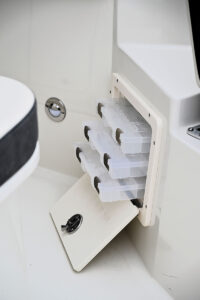 From the comfort and quality of the upholstery to the storage locker doors and the overall fit and finish, I could find no flaws — only a rich collection of ideas for families who like to fish occasionally or enjoy running in open water with safety.
From the comfort and quality of the upholstery to the storage locker doors and the overall fit and finish, I could find no flaws — only a rich collection of ideas for families who like to fish occasionally or enjoy running in open water with safety.
For instance, the self-draining walkaround cockpit is over 20 feet of fiberglass sole with molded non-skid, with room on both sides of the console for an adult to walk fore and aft without being cramped. Cockpit depth at the helm is 3 feet, 6 inches, providing security for smaller family members and active fishermen alike. Stainless steel grabrails are abundant and well-placed for moving safely about when the boat is underway.
There’s seating for 11 people, starting with a fold-down transom bench, two seats atop the cooler with headrest cushions, two helm seats, two seats ahead of the console, and a pair of bench seats with removable backrests that form forward-facing lounges. For long days on the water, the center console has a human-sized space inside for changing, even when equipped with the optional Dometic porcelain head with a holding tank and pump out. 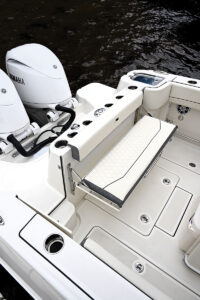
Fishing features are well thought out, starting with a 25-gallon livewell to port at the top of the transom, twin fishboxes beneath the aft sole (equipped with drains and diaphragm pumps), and a plethora of factory-installed drained rod holders in gunwales. In the back of the helm seating, Stingray included multiple storage drawers for fishing tackle and tools, under-gunwale storage for gaffs, nets and rods, and tubular stainless steel toekicks for fishermen needing sure footing when leaning up against coaming pads.
Those coaming pads, by the way, extend well forward to cushion guests from possible bruises when walking alongside the console underway. Another notable feature: A through-stem anchor roller for a 14-pound Delta plow anchor, and a below-deck Lewmar v700 windlass for a chain and rope rode.
Sweet spot
The helm console in the boat I tested had a Garmin 1243 Touch multifunction display, with plenty of room for a second 1243 screen. An Airmar B150M Chirp is standard and upgradable to an Airmar B175M for more serious fishing features. An option to consider is the Garmin Fantom 18 radar.
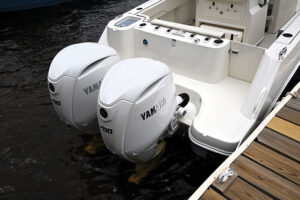 There was a twin-engine Yamaha binnacle and optional joystick for easy maneuvering around the docks on the boat I tested. Sliding seats with flip-up bolsters and a tilting stainless wheel made steering from a sitting or standing position very comfortable.
There was a twin-engine Yamaha binnacle and optional joystick for easy maneuvering around the docks on the boat I tested. Sliding seats with flip-up bolsters and a tilting stainless wheel made steering from a sitting or standing position very comfortable.
When testing the 253CC, equipped with a pair of 200-hp Yamahas, the boat rises onto plane in 3 to 4 seconds with minimal bow rise — virtually none. It reached 30 mph in 6 seconds, which was its most efficient sweet spot. At 3500 RPM, the boat ran at an indicated 28 mph, burning a combined 9.9 gph, and achieving 2.8 mpg. The Yamaha EX steering was flawless, carving turns as comfortable or as tight as I wished. The boat handled both the wake-induced waves and the windblown chop with aplomb.
In terms of build, the hull sides and the running surface in between the lifting strakes are a cored structure. The transom is reinforced with 2 inches of sturdy, rot-proof Coosa Composites board bonded to large stringers that extend under the swim platform and splashwell. Where structures like the T-top are attached, there are Durabond marine panels for optimal mechanical fastening strength. I didn’t hear a squeak once from the T-Top, and didn’t expect to, knowing about Stingray’s warranties: 1-Year Limited General; 3-Year Limited Osmotic Hull Blister; and 10-Year Limited Lifetime Transferable (for up to five years) Structural Hull. 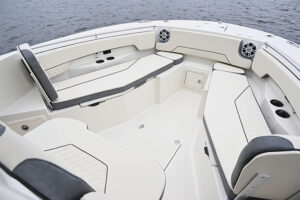
There’s a lot more to like about the new Stingray 253CC, but to realize that, I’d urge you to find one at the next available boat show or through your local dealer. Get a test ride if you can. It’s proof positive that this center console checks all the boxes.

The deep-V ride is admirable.
The space inside feels human-sized, not at all cramped.
The fit and finish are superb.

It would be good if the removable backrests for the forward seating had a dedicated storage space.
Specifications
- LOA (w/swim platform): 25’3″
- Beam: 9’3″
- Draft (up): 1’6″
- Weight (w/engines): 5,600 lbs.
- Fuel Capacity: 128 gals.
- Water Capacity: 13 gals.
- Power (as tested): 2 x 200-hp Yamaha Four-Stroke
- Base Price: Contact dealer
- Website: stingrayboats.com
Dealers
- Find your local dealer at stingrayboats.com


